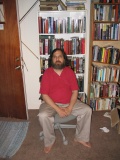Richard Stallman
| Birthname | Richard Matthew Stallman |
| Date of Birth | March 16, 1953 |
| Birth Place | New York, New York |
| Nationality | American |
| Occupation | Creator of GNU Operating System |
| Biography | Launched the Free Software Movement and GNU Operating System |
Richard Stallman (born March 16, 1953) is an american software freedom activist and software developer. In 1983 he launched the Free Software Movement, as well as his plans to develop the GNU Operating System, a completely free Unix-like operating system.[1] Two years later, in October of 1985, he started the Free Software Foundation, of which he is still president and volunteer.[2]
Stallman authored the GNU General Public License, which implements copyleft, a concept he coined to protect the modification and redistribution rights of free software.[3] Stallman is responsible for the core development of a number of widely used software components of the GNU system, including the GNU Compiler Collection (gcc)[4], the GNU symbolic debugger (gdb)[5], and GNU Emacs[6].
Contents
Early Life and Education
Richard Matthew Stallman was born March 16, 1953 to Daniel Stallman and Alice Lippman in New York City. [7] He attended Harvard beginning in 1970 and graduated with a Bachelor of Arts in physics in 1974. He began working at the Massachusetts Institute of Technology as a programmer for the Artificial Intelligence Lab in 1971. From September 1974 to June 1975 he was a graduate student in physics at MIT. During this time, Stallman became a dedicated member of the hacker community, where he became known as his initials "rms," the name he used for his computer accounts.
During the late 1970s and early 1980s, the hacker culture at MIT shifted as developers wanted to prevent their software from being used by competitors. During these years many manufacturers stopped distributing source code and enacted protective software licenses to limit copying and redistribution. This upset Stallman, as it went against his developing philosophy on free software, and ultimately led to his resignation from his position at MIT in February 1984.[8]
The GNU Project
Stallman announced his plans for the GNU operating system in September 1983. GNU is a recursive acronym which stands for "GNU's Not Unix," as the operating system is both Unix-like and Unix-compatible. In 1985, Stallman published the GNU Maifesto, which detailed his plans and motivation for GNU. The central philosophy of GNU is outlined in Four Essential Freedoms[9] (typically numbered programmatically 0-3) as follows:
- Freedom to run the program
- Freedom to study and change the program in source code form
- Freedom to redistribute exact copies
- Freedom to distribute modified versions
In 1991, Linus Torvalds, a Finnish-American software developer, released the Linux kernel, an operating system kernel based on the GNU system. Since then, the Linux operating system is now among the most widely used, especially among developers. The terminology used when referring to Linux is controversial, as Stallman feels that the name Linux alone does not offer sufficient credit to its basis in GNU. Stallman has repeatedly asked that it be referred to as GNU/Linux (or more recently GNU+Linux) because it conveys a more accurate representation of "the system's origin, history, and purpose."[10]

Activism
Stallman frequently gives speeches on the free software movement and related topics. Common speech titles include The GNU project and the Free Software Movement,[12] The Dangers of Software Patents,[13] and Copyright and Community in the Age of computer Networks.[14] Stallman is also an avid protester, and has participated in protests against software patents,[15] proprietary software, and DRM.[16]
Along with his efforts for free and Open Source Software, Stallman supported the concept of a free and publicly-maintained electronic encyclopedia, which he called GNUpedia. GNUpedia merged with a similar project of the time, Nupedia, which was based on the GNU free documentation license. This project was retired in favor of Wikipedia, which had adopted the same philosophy and was experiencing greater success.[17]
Stallman uses a Lemote Yeelong, a netbook with a Loongson chip and a 9-inch display. During an interview he stated "This is my only computer, and I use it all the time. I chose it because I can run it with 100% free software even at the BIOS level." It runs one of the totally free GNU/Linux distributions, gNewSense.[18]
Honors and Awards
- 1986: Honorary lifetime membership of the Chalmers University of Technology Computer Society[19]
- 1990: Exceptional merit award MacArthur Fellowship ("genius grant")[20]
- 1990: The Association for Computing Machinery's Grace Murray Hopper Award[21]
- 1998: Electronic Frontier Foundation's Pioneer award[22]
- 1999: Yuri Rubinsky Memorial Award[23]
- 2001: The Takeda Techno-Entrepreneurship Award for Social/Economic Well-Being[24]
- 2002: United States National Academy of Engineering membership[25]
- 2007: First Premio Internacional Extremadura al Conocimiento Libre[26]
Stallman also holds Honorary Doctorate Degrees from Sweden's Royal Institute of Technology (1996), University of Glasgow (2001), Vrije Universiteit Brussel (2003), Universidad Nacional de Salta, in Argentina (2004), Universidad de Los Angeles de Chimbote, in Peru (2007), University of Pavia (2007), Universidad Nacional de Trujillo, in Peru (2008), Lakehead University in Canada (2009), Universidad Nacional de Córdoba, in Argentina (2011), Universidad Latinoamericana Cima de Tacna, in Peru (2012), and Universidad José Faustino Sanchez Carrió, in Peru (2012) [27]
Publications
Papers in Technical and Academic Journals
- Stallman, Richard M; Sussman, Gerald J (November 1975). Heuristic Techniques in Computer-Aided Circuit Analysis. CAS-22 (11). IEEE Transactions on Circuits and Systems.
- Stallman, Richard M; Sussman, Gerald J (1977). Forward Reasoning and Dependency-Directed Backtracking In a System for Computer-Aided Circuit analysis. Artificial Intelligence 9. pp. 135–196.
- Richard Stallman, Reevaluating Copyright: The Public Must Prevail, Oregon Law Review 75(1) 1996.
- Stallman, Richard M (2009). Viewpoint: Why "open source" misses the point of free software. Communications of the ACM 52(6). pp. 31–33.
- Stallman, Richard M (2010). Is digital inclusion a good thing? How can we make sure it is?. 48. Communications Magazine, IEEE. pp. 112–118.
Manuals
- Stallman, Richard M (1980). EMACS: The Extensible, Customizable, Self-Documenting Display Editor. Cambridge Massachusetts: MIT: MIT Artificial Intelligence Laboratory publication. AIM-519A.
- Stallman, Richard M (2002). GNU Emacs Manual. Boston, Massachusetts: GNU Press.
- Stallman, Richard M; McGrath, Roland; & Smith, Paul D (2004). GNU Make: A Program for Directed Compilation. Boston, Massachusetts: GNU Press.
Essays
- Stallman, Richard M (2010). Free Software, Free Society: Selected Essays of Richard M. Stallman, Second Edition. Boston, Massachusetts: GNU Press.
Biography
- Williams, Sam (2010). Free as in Freedom (2.0): Richard Stallman and the Free Software Revolution. Boston, Massachusetts: GNU Press.
External Links
Richard Stallman's personal website GNU.org The Free Software Foundation Free Software, Free Society: Selected Essays of Richard M. Stallman
References
- ↑ http://www.gnu.org/gnu/initial-announcement.html The Initial GNU Announcement
- ↑ http://www.fsf.org/about/leadership/ The Free Software Foundation Management
- ↑ http://www.dwheeler.com/essays/gpl-compatible.html Make Your Open Source Software GPL-Compatible, Or Else
- ↑ http://gcc.gnu.org/
- ↑ http://www.gnu.org/software/gdb/
- ↑ http://www.gnu.org/software/emacs/
- ↑ http://oreilly.com/openbook/freedom/ch03.html Chapter 3, Free as in Freedom
- ↑ http://www.stallman.org Richard Stallman's personal website
- ↑ http://www.gnu.org/philosophy/philosophy.html Philosophy of the GNU Project
- ↑ http://www.gnu.org/gnu/why-gnu-linux.html What's In A Name?
- ↑ http://www.dwheeler.com/essays/gpl-compatible.html Make Your Open Source Software GPL-Compatible, Or Else
- ↑ http://fsfeurope.org/documents/rms-fs-2006-03-09.en.html Transcript of "The GNU project and the Free Software Movement" Speech
- ↑ http://www.ifso.ie/documents/rms-2004-05-24.html Richard Stallman: The Dangers of Software Patents (transcript)
- ↑ http://www.gnu.org/philosophy/copyright-and-globalization.html Copyright and Community in the Age of computer Networks (transcript)
- ↑ http://wien.kpoe.at/news/article.php/20050803081612703 Protest in Brussels against software patents
- ↑ http://stopdrm.info/index.php?2006/06/11/89-on-remet-ca-paris Protest in France to stop DRM
- ↑ http://www.gnu.org/encyclopedia/ The Free Encyclopedia Project
- ↑ http://richard.stallman.usesthis.com/ Interview with Richard Stallman for usesthis.com
- ↑ http://www.ait.gu.se/aktuellt/kalendarium/Aktuellt_detalj/?eventId=1775246748 "Talk by Richard rms Stallman". Chalmers University of Technology.
- ↑ http://www.macfound.org/site/c.lkLXJ8MQKrH/b.1142703/k.787E/Fellows_List__August_1990.htm John and Catherine Foundation
- ↑ http://awards.acm.org/citation.cfm?id=9380313&srt=alpha&alpha=S&aw=145&ao=GMHOPPER Grace Murry Hopper
- ↑ https://w2.eff.org/awards/pioneer/1998.php Torvalds, Stallman, Simons Win 1998 Pioneer Awards
- ↑ http://www.ahref.com/guides/industry/199907/0727piou2.html Richard Stallman Wins Microsoft's Money
- ↑ http://www.takeda-foundation.jp/en/aboutus/topics/p20010911.html The Takeda Foundation
- ↑ http://www.nae.edu/MembersSection/Directory20412/30606.aspx National Academy of Engineering
- ↑ http://www.20minutos.es/noticia/197555/0/richard/stallman/linux/ El padre del software libre, Premio Internacional Extremadura
- ↑ http://www.stallman.org/ Richard Stallman's Personal Website

